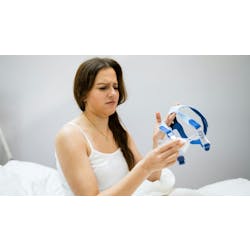© Dieter Hawlan - Dreamstime.com
Practicing in correctional facilities can offer financial security and professional satisfaction and freedom
Anne nugent Guignon, MPH, RDH, CSP
In today’s competitive job market, a growing number of dental hygienists are looking into providing clinical services in either state or federal prison facilities. Like any other setting, there are pluses and minuses, and despite what one might think, hygienists who work in these settings feel valued and happy. Vickie, Brittany, and Misty share amazing insights into a work world many of us have never considered.
Starting the journey
There are dramatic differences between state-run and federal facilities and how hygienists are hired, although many similarities do exist.
Five and a half years ago, Vickie landed the best position of her entire dental hygiene career. Even though she presented a table clinic about oral health challenges in a correctional facility when she was getting her dental hygiene degree 20 years ago, it never occurred to her that she would end up providing care in a prison setting.
According to Vickie, her state’s prison system requires applicants to have a minimum of two years of clinical experience and an associate’s degree. While jobs can show up at any time, the turnover is generally very low. In the past, the hygienist would provide services for three different prisons in a region. But now, when a correctional facility opens in her state, a new full-time dental hygiene position is automatically created.
In the federal system, job openings for positions are posted online for two weeks. There are specific requirements and a firm closing date for each position. Applicants must complete the initial application online. All federal positions require multiple steps, and there are additional mandates for employment by the Bureau of Prisons (BOP).
Final job offers are made 80 days after the announcement closing date.
Three years ago, in March, Brittany applied for a position at a federal penitentiary in her area. After her initial submission, she was required to complete a core value assessment (CVA). According to Brittany, the CVA screening is based on common sense and evaluates if an applicant has the right temperament and outlook to work in a correctional institution. After passing the CVA, the prospective candidate is evaluated by a pre-employment panel that conducts a live interview. Brittany’s interview took nearly half a day.
Misty’s journey was different. After four years, the rigors of private practice were taking a toll, and she was grappling with multiple stress-related conditions. “I will never forget the cold call I received from MidAmerica Health. It was while I was sitting in the parking lot at my local CVS pharmacy. I remember not being overly excited about working in a prison, but I was open to visiting the facility for an interview.”
Misty is an employee of MidAmerica Health, a private contractor that provides dental services for inmates in local, state, and federal facilities at locations in 10 states. Misty has worked as a full-time employee for 10 and a half years and currently provides services at three different facilities. A current state dental hygiene license is the only employment requirement.
Different backgrounds
Vickie joined the state prison staff as a seasoned clinician with a strong academic background, including a bachelor’s and a master’s degree in dental hygiene. She had spent time in private practice and also taught at a local dental hygiene school. Certainly, her life experiences allowed Vickie to make a smooth transition into the new position, but she knows confidence and the ability to control a situation verbally are important traits in this environment.
Brittany’s preparation was very different. She completed an associate’s in dental hygiene eight years ago and a bachelor’s degree in social sciences in 2014. Brittany received a job offer in June and began her new position in October. The BOP views all those who work in the federal system as correctional officers first, and every BOP law enforcement officer must undergo three weeks of training, known as “Introduction to Correctional Techniques” at a Federal Law Enforcement Training Center (FLETC). The new employees are paid during the training period and all expenses are covered. As a sworn officer, Brittany was required to complete firearm training and must complete an annual recertification.
Misty earned her bachelor’s degree in 2004 at the age of 25 and was looking forward to a lifetime career in a private dental practice. Just four months later, she obtained a job at a local dental office, one she actually had her eyes on prior to even attending college for dental hygiene. Four years after that, she accepted the position within the prison system. Like Vickie, she had no prior background, experience, or even interest in criminal justice. The corrections facilities in which she works do not provide any kind of correctional training, but she says it certainly would be welcomed and helpful in daily operations.
Providing professional care
Vickie is a baby boomer, Brittany is a millennial, and Misty is a Gen Xer, but their philosophies of patient care are very similar. All three have fielded many comments from fellow hygienists who say they could never provide care to murderers, rapists, or drug dealers. And all three feel strongly that they are providing professional health-care services to human beings. Brittany knows that it takes a special personality to work in this type of environment and that it is critical to be patient, calm, and nonjudgmental.
The state correctional facility where Vickie works is classified as a long-term facility. The offenders are serving sentences for serious crimes, and some are in for life. She does not know her patients’ criminal histories. Vickie says 98% of her patients are very nice, respectful, and friendly. They appreciate her professionalism and her efforts to help them achieve good oral health. In the rare cases that inmates start to act out, Vickie reminds them that their behavior is not appropriate, and she has complete freedom to dismiss patients who do not comply immediately.
The federal prison where Brittany works has a variety of security levels, from minimum to maximum. Many of the inmates will not serve their entire sentence at this location. Brittany also finds most inmates are very polite and appreciative of her services. And, like Vickie, she is free to dismiss anyone who gets out of line.
Misty knew when she took the position that she would be treating people who had committed awful crimes, so she tries to distance herself emotionally and focus on the care she is expected to provide. She too treats the inmates with respect, and they return the favor. She has the capability to obtain information about an inmate’s crime, and sometimes looks at it, but then usually regrets it. All inmate medical charts contain the inmate’s sentence start and end dates, so she can usually infer the severity of the crime. Whether an inmate has a two-month sentence or a life sentence, she treats them with the same amount of respect in the dental clinic.
Safety issues
Many people wonder if working in a prison is safe, and according to Vickie, there are many protocols in place to ensure safety. Employees are patted down and pass through a full-body scanner prior to entering the facility every day. They are not allowed to take personal items inside other than their prison ID: no debit cards, books, newspapers, or food.
While Vickie’s patients know what month they will be seen, they are only told of their appointments the night before, and not told the exact time. Prisoners wait in their cells and are escorted by a medical officer to Vickie’s room at the appropriate time. Inmates arrive in full ankle and waist restraints. Vickie is not allowed to share any personal information with her patients. She can discuss oral health or innocuous subjects such as weather or sports. All of these measures are in place to ensure worker safety.
The prison where Brittany works is different. The only item she is not allowed to bring in to the facility is a cell phone, but she has a computer and landline, so is able to keep contact with the outside world. Brittany says it takes about 15 minutes to get through the security gate and the scanner, so she finds it best to stay inside until her shift is over. If there is an institutional emergency, the entire prison is locked down and no one is able to leave. Everyone in the federal prison is considered a correctional officer first, which means even a noncustodial employee like Brittany can be required to work a custody post, including a housing unit.
Rather than focusing on being afraid, Brittany prefers to use her energy to remain alert to her surroundings. Unless a prisoner is a security risk or has mental health issues, her patients arrive unescorted and unshackled. High security-risk patients are allowed preventive care; however, they are escorted to the dental appointment by a lieutenant and three or four officers. As an added precaution, they arrive wearing hand and leg cuffs. As a federal correctional officer, Brittany wears a duty belt that has a body alarm, facility keys that are appropriate to her workspace, a radio, pouch with gloves, and a bottle of oleoresin capsicum (OC) spray, which is a very strong form of pepper spray.
Misty carries a “man down” button in her pocket, which is connected to the prison alarm and radio network. If activated, a distress call is sent, and help arrives immediately. She has never had to use the button. The inmates are dismissed from their housing units only if they have a “pass.” These passes are entered into the system the day before their appointment and received by the inmate the night prior to their appointment. Inmates are not escorted to the dental clinic; they arrive of their own free will, hand dental staff their passes, and have a seat in the waiting room until they are called. They are not cuffed and shackled unless they are housed in a segregation unit for disciplinary reasons. Misty’s conversations with her patients have to be superficial (e.g., weather, sports, oral health).
The schedule
The three-chair dental suite at Vickie’s prison is a part of the medical department, where she and the staff dentist provide all dental services. The department also has two medical exam rooms, a telemedicine room, pharmacy, lab, three isolation cells, a four-bed infirmary, and a room for eye exams.
Through the years, Vickie has developed a recall system that keeps her schedule full and ensures that patients are seen in a timely fashion. Inmates fill out a paper form to request an appointment. The approval process takes two months. Each year, she treats around 500 patients on average. Most inmates are seen twice a year, but she treats periodontal patients every three months. The inmates at Brittany’s prison are seen once a year, but there is a wait list. The inmates at Misty’s prisons are also seen once a year but are only scheduled if they send a request. There is also a wait list, which ranges from two to six months, based on demand.
Vickie’s daily schedule is much lighter than a typical private practice. She averages six patients a day and has a full hour for each. She counts all of her instruments three times a day and is responsible to pull and review her patient charts and clean and prepare her operatory for each visit. Each day, there is a break when all the inmates return to their cells for a headcount. From a safety standpoint, there has to be a complete census.
When Brittany joined the prison, she was able to create a flexible schedule that allows her to take college classes to complete her next educational goal. She has complete control over her schedule and how many patients she sees. And she can see an inmate as often as needed, but prison policy states that they are eligible for one visit a year.
All of Brittany’s instruments are kept in a locked cabinet and she performs an instrument count at the beginning and end of every day. There are prisoners who act as orderlies, keeping the treatment areas clean and performing infection control. Brittany works with a team of two dentists.
Each of the prisons where Misty works is allotted a certain number of dental hygiene hours, so most MidAmerica Health hygienists work at multiple locations. The inmates are only allowed one visit per year and must have served for a year before they are eligible to request care. Because of this limitation, the actual appointment can be quite difficult, but she only treats six or seven patients in her eight-hour day. She has to count instruments twice per day. Her instruments are secured in a locked cabinet when not in use. There is also downtime for the institution-wide count, which typically takes an hour. The dental staff is expected to take a lunch break during this time. Misty works with seven different dentists between the three facilities. She likes the change of scenery and coworkers from day to day.
Home-care products
Home-care products are very limited at Vickie’s facility. Inmates are not allowed to use any type of powered toothbrush, oral irrigator, or standard dental floss. They are issued small packets of toothpaste and a finger toothbrush that allows them to brush one tooth at a time. They can purchase shankless toothbrushes, devices designed with a rubbery or flexible handle that can’t be whittled down into a weapon. Floss picks and small tubes of paste are also available in the prison store. Brittany’s facility has a different policy. Typically, inmates are provided with a standard toothbrush, dental floss, and toothpaste. Inmates who are classified as high risk do not receive any oral hygiene products. Misty’s facilities are classified as low to medium security, so inmates have the opportunity to purchase regular manual toothbrushes, toothpaste, regular floss, and floss picks.
Rewards beyond the dollars
Vickie and Brittany both consider the freedom to practice dental hygiene as one of the most notable things about their current work settings. Neither has to worry about production goals, patient no-shows, coding, or fees. They feel fully supported by the doctors and have open conversations about patient care. Both can order any equipment or supplies.
Since Vickie’s facility is just over five years old, the design and equipment are state of the art. There is one small drawback: Vickie is not allowed to bring any supplies or samples into the unit. This reduces her ability to try a new product or use a sample. Brittany can bring in samples of products like prophy paste or fluoride varnish, but is not allowed to bring in any products to give to patients. Misty is not allowed to bring in any kind of samples or products to use. Her facilities are rather old, so the equipment is not top-notch, but it gets the job done with proper patient care.
Vickie is a full-time salaried employee, and her benefit package is more robust than most clinicians practicing in a more traditional setting; it includes health insurance, sick leave, personal leave, vacation time, short- and long-term disability, and a retirement plan, including a matching funds provision. In addition, all expenses are paid for an annual three-day continuing education conference hosted by the state department of corrections. “I love my job! When I read about colleagues having to deal with insurance coding, up selling, hateful patients, a micromanaging office manager, or clocking out early or in between patients . . . I’m so thankful for my prison job!”
Brittany’s benefits as a federal employee are very similar, and she has every intention to continue as a BOP employee until she is eligible for full retirement. “I’m able to work overtime if I want to. I can work a housing unit or request overtime to work control or perimeter posts, positions that do not have inmate interaction.”
Misty is given 200 hours of personal time off at the beginning of every year. The hours do not carry over from year to year and are used for sick leave, vacation, or personal time off. She also receives 16 hours of CE leave annually. Even though her hourly pay is a few dollars lower than the private practice average, Misty feels the lower stress level and smaller patient schedule is worth it. She is not able to work overtime.
Final thoughts
When Brittany started working in the federal prison two years ago, a colleague suggested the book Games Criminals Play: How You Can Profit by Knowing Them by Bud Allen and Diana Bosta. Even though the book was written two decades ago, it provides a basic understanding of how inmates try to control interaction with correctional personnel. The book outlines how inmates observe and select victims and shows the reader how to recognize, prevent, and stop manipulation. This book provides hygienists considering applying for a prison position a head start.
Vickie, Brittany, and Misty have found their forever dental homes, and while their practice settings may not appeal to everyone, they are happy, earning a living, and securing a comfortable future. All three are committed to patient care, which to this day still remains the real reason for becoming a health-care provider.Additional resources
• Dental Hygienist. Department of Justice, Bureau of Prisons/Federal Prison System. USAJobs website. https://www.usajobs.gov/GetJob/ViewDetails/519731700.
• How do I increase my grade or step? FederalPay.org website. https://www.federalpay.org/article/promotions.
• Pay & leave: Salaries & wages. US Office of Personnel Management website. US Office of Personnel Management website. https://www.opm.gov/policy-data-oversight/pay-leave/salaries-wages/2018/general-schedule/.
• Federal Bureau of Prisons locations. Federal Bureau of Prisons website. https://www.bop.gov/locations/map.jsp.
ANNE NUGENT GUIGNON, MPH, RDH, CSP, provides popular programs, including topics on biofilms, power-
driven scaling, ergonomics, hypersensitivity, and remineralization. Recipient of the 2004 Mentor of the Year Award and the 2009 ADHA Irene Newman Award, Anne has practiced clinical dental hygiene in Houston since 1971, and can be contacted at [email protected].
Training at the FLETC
New hires from 91 different government law enforcement agencies undergo standardized law enforcement training. In order to continue employment, all new Bureau of Prisons (BOP) employees must pass the training, which includes:
• dragging a 70-pound dummy across the gym floor for three minutes;
• completing a mini-obstacle course (jumping over and under barriers);
• firearm training with a 9 mm handgun, M16 rifle, and shotgun (under BOP policy chaplains and physicians do not receive this training);
• self-defense training;
• classroom instruction; and
• passing two written tests.
Types of federal prison facilities
• Private/contracted, federal, metropolitan
• Detention center: pretrial detention facilities; inmates of all security levels
• Prison camp: minimum security, work and program oriented
• Correctional institution: low and medium security, work and program oriented
• Correctional complex: multiple security levels
• US penitentiaries: medium and high security
• Medical center: specializes in long-term medical or mental health care
• Transfer center: houses inmates in transit to other facilities
Highlights: Working for the Federal Bureau of Prisons
Conditions of employment
• US citizenship
• Current license in a US state, district, or territory
• Graduate of dental hygiene school accredited by US government
• One year of clinical experience
• 36 years of age or younger
• Priority given to veterans, who may be exempt from age requirement
Application requirements
• Résumé
• College transcript
• Basic background investigation (not a security clearance)
• Credit check
• Core value assessment
• Pre-employment panel and interview
• Drug test and physical exam
• Fingerprinting
• Completion of three-week training
Benefits
• Salary (based on federal pay scales)
• Raises for promotions and length of service; annual raises
• Retention bonuses
• Medical, dental, and vision insurance
• Additional insurance (e.g., life, long-term care)
• Flexible spending account
• Annual family medical and sick leave
• Federal holiday pay
• Retirement plans and matching
• CE course fee reimbursement
• Student loan repayment (case-by-case basis)
Additional information
• Average yearly salary (2019): $48,865 to $62,612
• Locality pay (increased pay in certain metro and rural areas)
• Opportunity to work overtime
• Eligible for time off and monetary awards
• Full retirement: eligible after 20 years’ service
• Mandatory retirement: age 57
• Annual firearms recertification








